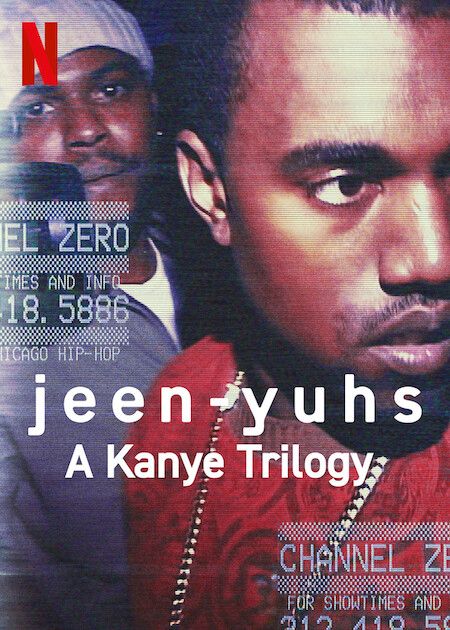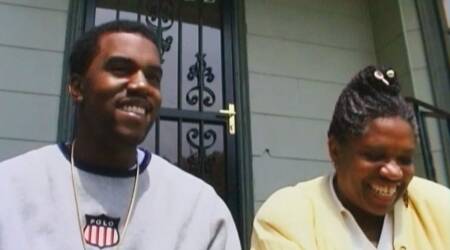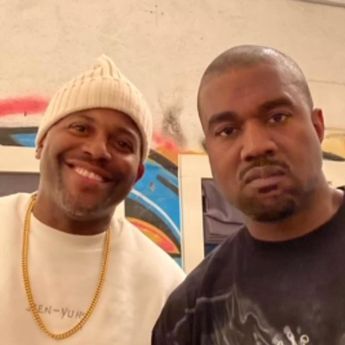
TV REVIEW: jeen-yuhs
 As the negative reviews for “Donda 2” started pouring in, I was waiting for a different sort of sequel made possible by the artist known as K. West.
As the negative reviews for “Donda 2” started pouring in, I was waiting for a different sort of sequel made possible by the artist known as K. West.
“Jeen-Yuhs” was one of the main reasons why I moved out of the Lyn-Mo projects within a month’s time of sitting there : in the small town of Armour,SD there was only one movie theater with only one screen, and by the time I left, the Loraine theater had just gotten it’s hands on the latest Spidey flick that I reviewed last November.
With Jeen-Yuhs gearing up for a limited single day February release date, I had to get back to a big city. Inevitably, I missed Jeen-Yuhs in theaters, but the postponement for viewing the feature was one I could not complain about. After I waited with bated breath for the second season of “Euphoria”, when that zero season started popping up, I stopped watching streamed shows with a vow that I would only watch film if it was theatrically released, to prevent the illnesses known as binge-watching and post season finale sickness (patent pending). So Coodie’s Netflix series “Jeen-Yuhs” fit the bill, an advertised (I’m looking at you “Dune”) trilogy to be watched in one-sitting.
The film takes viewers through the first person lens of one of Kanye’s childhood friends as he films the rap impresario and a majority of those closest to him. A unique film in that it is a look behind the cameras focused on someone who’s life is constantly in front of the cameras; by delving into that oxymoronic description of this film, “Jeen-Yuhs” is eponymous. A noun as much as it is an adjective. And though it primarily focuses on Kanye’s rise to stardom and his accomplishments, the film sheds light on Coodie’s star as a director too, making it hard to tell which “Jeen-Yuhs” is being referred to, since Coodie had the sense to start filming Kanye way before his gradual ascent.
“Jeen-Yuhs” is essentially Kanye’s “Last Call” with an epilogue of everything Kanye went on to become after releasing “College Dropout” to the world. Never would I have thought I would see H-Town All-Star Scarface leave a studio session without recording and saying he couldn’t write to a beat, nor would I have thought I would have ever got to witness the rudeness of A&R’s towards Kanye’s demos (as he previously described on “Last Call”) or seen some of the hospital footage of Kanye getting his jaw fixed after his infamous (nearly fatal) vehicular collision. With cameos from Hip- Hop lumineers like Pharell and Common the human side to those who are now regarded to as Hip-Hop royalty makes the film a can’t miss for Hip-Hop heads, and for those who wonder what it would be like to stand on the side of these artists like an old friend, leaving them completely with their guard down and unfiltered in a way unseen before Coodie’s camera caught them.
From misquoted interviews in Hip-Hop magazines to biting critique’s on his presidential run, the stress on Kanye’s life that has been known to give fuel to a myriad of media circuses is brought down to a grounded level, taking the smokescreen away from Kanye’s infamous rants and finally displayed through the perspective of a man venting to who he views as his closest confidants.
The sting of the limelight is more than documented from this lens as the further Kanye gets away from his roots the more disastrous occurrences pop up in his personal life to balance the artist’s good fortune in public, which is not a simple topic since those lines are constantly blurred within the life of a public figure like West. At least Coodie gets to hide the worst of his life behind the lens and focuses on the best parts like the endearing birth and growth of his daughter as well as his respectable filmography outside of his work with West. Coodie’s life in the film is filled with nothing but the best, because he can select what he wants to show being behind the film, West on the other hand is completely exposed – but it’s hard to fill pity for the Emperor’s nakedness, because that’s what he signed up for, whether he knew it or not.
 Which brings me to the life and death of Kanye’s mother Donda. From her interactions with her son from the steps of his childhood home to Grammy winning album release parties, Donda showed herself to be the best P.R. representative Kanye couldn’t buy with a million dollar smile that only he could be grateful enough to inherit. Despite the beauty of their relationship, and the intelligence and decorum she bestowed on her son, her vanity is what consumed her and ultimately took her life.
Which brings me to the life and death of Kanye’s mother Donda. From her interactions with her son from the steps of his childhood home to Grammy winning album release parties, Donda showed herself to be the best P.R. representative Kanye couldn’t buy with a million dollar smile that only he could be grateful enough to inherit. Despite the beauty of their relationship, and the intelligence and decorum she bestowed on her son, her vanity is what consumed her and ultimately took her life.
Kanye’s song “Hey Mama” doesn’t sound as sweet in the moments of the film where Kanye is on the phone with his father, who was placed at a distance from him because of his mother’s custody battle over a young Kanye – a repeating theme within the lives of Afro-Centric youth worldwide. It is an absolute pain to see a man turn into a billionaire, but to come from and still be plagued by the inherit ills of a system built for him to fail.
Words like those are reminiscent of Kanye’s verse on T.I.’s “Welcome To The World”. So many of this man’s verses and melodies are stuck in the heads of myself and the rest of his supporters worldwide, it’s a privilege to sing a long with Coodie’s rare footage of the God DJ/MC in the studio going at it acapella over his first rap feature (over Timbaland production nonetheless, *see “The Bounce”) while in obvious awe of a Jay-Z fresh off the success of his greatest album (*see : The Blueprint) coaching him through the booth like a concert conductor at Disney Hall. From Kanye’s “chaining day” to Cam and Memphis Bleek begging Kanye for some beats, it’s all here and even though I’ve never really enjoyed the pen game of those aforementioned emcees, I now understand why the king of all corny emcees , Ma$e, is Kanye’s favorite rapper.
From the first shot of the film Kanye is the only Chicago spitter standing with a group of N.Y. based rappers, but this isn’t the Roc – Kanye is standing with Ma$e’s Harlem World. To see this from a Kanye in his late teens and then to fast forward to Kanye in his forties calling up Coodie and some of the same guys from these first clips Coodie filmed, made me revere and recognize the loyalty that Kanye has towards anyone that has helped him out along the way. This is the type of guy that never forgets a name. Thanks to these elements being recorded in “Jeen-Yuhs” I found a newfound respect for the man known as Kanye West. Still, this newfound respect doesn’t make me overlook the glaring fact that after Kanye started taking medication for being bi-polar, his creativity has been in a tailspin. Releasing albums that do not stand up to his previous opus’ , around the time post “TLOP”.
 Things even get so out of hand because of Kanye’s pharmaceutical usage that at one session for his overrated Grammy winning “Jesus Is King” album, Ye is having a conversation with some stuffy real estate agents in Dominica, admitting to having popped pills the night before and Ye goes off on the obviously condescending and patronizing agents, to the point where Coodie makes the educated decision to cut the camera off.
Things even get so out of hand because of Kanye’s pharmaceutical usage that at one session for his overrated Grammy winning “Jesus Is King” album, Ye is having a conversation with some stuffy real estate agents in Dominica, admitting to having popped pills the night before and Ye goes off on the obviously condescending and patronizing agents, to the point where Coodie makes the educated decision to cut the camera off.
This happens a few more times in the closing points of the film, except at one point where the camera couldn’t have been cut off because Kanye was on the campaign trail for the U.S. presidency and ended up having an episode after admitting on the recording that he had just taken his prescribed “medication”.
Kanye’s battle with bi-polar disorder has been nothing new, as he spoke about checking into mental institutions as early as his verse on Common’s 2005 John Legend collabo “They Say”, but he hasn’t talked about taking medication until he got married to his now ex-wife, Kim Kardashian – who involuntarily checked him into a mental facility during The Life of Pablo sessions.
As a person who also has been diagnosed with bi-polar disorder, Kanye’s success as a person who also is mentally “disabled” is inspirational. But the difference between the two of us is that I haven’t popped a pill voluntarily for nearly a decade, because I am aware that the pharmaceutical industry manufactures substances for customers, not for cures.
To see Kanye fall victim to this institution explains alot about his decline in musical ability over his span of albums post “Pablo”, a scapegoat to point to as the death of his mother (aka the human relations department in the world of Kange) can be referenced as to why after “Graduation” , Kanye was now looked at as more outspoken, even though just three years prior he was on a telethon calling out the Bush Administration with no fear. But despite the percieved arrogance and bravado Kanye does have a fear : his god.
The biggest let down in this film is the lack of self-acknowledgement that both Coodie and Kanye have for their own works of genius. They always give that to their respective deities, assumedly the absentee-father from the Judea-Christian mythos that Kanye mirrors throughout the film as he starts off walking alongside Jesus; to eventually being nailed to a cross by the media, and talking to a father he grew up believing forsook him over radio waves that cross over clouds.
For all their creative ability, both the director and the subject of the film pass the buck of the products of their own self-endowed creative endeavors and prowess to mysticism.
Yes, Kanye’s unwavering faith in himself was what allowed him the achievements he has garnered, but on the other hand, his religious beliefs are pitiful, and again another sore spot in the story of the Afro-Centric male in the Americas because Kanye and Coodie’s religious allegiances tell the story of the man who can never bring himself to be fully responsible for his own works, no matter how great they are.
Yes, Kanye has had plenty of help since day one, and a leg up over a majority of his peers and of the people who eventually became his mentors (Marcy Projects was definitely not a single parent home afforded by a University Professor), but that doesn’t mean Ye should not be afforded his genius or that his name shouldn’t be pronounced incorrectly every time he walks in the room. And for those who want to dispute that statement, Coodie has provided the receipt.
Score : 4/5
Author Profile
Latest entries
 Cinema CrusadersAugust 6, 2023MOVIE REVIEW: TALK TO ME
Cinema CrusadersAugust 6, 2023MOVIE REVIEW: TALK TO ME Comic BooksJune 21, 2023REVIEW: Wonder Woman No. 800 – Whatever Happened To The Warrior Of Truth Pt.II
Comic BooksJune 21, 2023REVIEW: Wonder Woman No. 800 – Whatever Happened To The Warrior Of Truth Pt.II Comic BooksJune 19, 2023REVIEW: Klik Klik Boom #1
Comic BooksJune 19, 2023REVIEW: Klik Klik Boom #1 Cinema CrusadersJune 17, 2023MOVIE REVIEW: THE FLASH
Cinema CrusadersJune 17, 2023MOVIE REVIEW: THE FLASH









